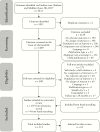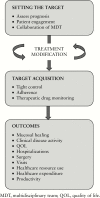Outcomes and Strategies to Support a Treat-to-target Approach in Inflammatory Bowel Disease: A Systematic Review
- PMID: 31403666
- PMCID: PMC7008150
- DOI: 10.1093/ecco-jcc/jjz131
Outcomes and Strategies to Support a Treat-to-target Approach in Inflammatory Bowel Disease: A Systematic Review
Abstract
Background and aims: Management of Crohn's disease and ulcerative colitis has typically relied upon treatment intensification driven by symptoms alone. However, a 'treat-to-target' management approach may help to address underlying inflammation, minimise disease activity at early stages of inflammatory bowel disease, limit progression, and improve long-term outcomes.
Methods: A systematic literature review was conducted to identify data relevant to a treat-to-target approach in inflammatory bowel disease, published between January 1, 2007 and May 15, 2017.
Results: Consistent with recommendations of the Selecting Therapeutic Targets in Inflammatory Bowel Disease [STRIDE] working group, studies have investigated factors influencing the achievement of both endoscopic and histological mucosal healing and patient-level outcomes in inflammatory bowel disease [IBD]. Histological healing and biomarker levels have also been shown to be modifiable outcomes. Although there is a lack of prospectively derived evidence validating mucosal healing as a treatment target, data are emerging to suggest that targeting mucosal healing or inflammation rather than symptoms may be cost-effective in some settings. The review highlighted several strategies that may support the implementation of a treat-to-target approach in IBD. The prospective randomised CALM study demonstrated how tight control [whereby treatment decisions are based on close monitoring of inflammatory biomarkers] leads to improvements in endoscopic and clinical outcomes. The review also considered the influence of coordinated care from a multidisciplinary team and patient engagement with improved adherence, as well as the role of therapeutic drug monitoring in inflammatory bowel disease management.
Conclusions: A treat-to-target strategy may impact on disease progression and improve outcomes in inflammatory bowel disease. Prospective studies including long-term data are required to ensure that the most appropriate targets and strategies are identified.
Keywords: Endoscopy; inflammatory bowel disease; outcomes.
© The Author(s) 2019. Published by Oxford University Press on behalf of European Crohn’s and Colitis Organisation.
Figures


References
-
- Torres J, Billioud V, Sachar DB, Peyrin-Biroulet L, Colombel JF. Ulcerative colitis as a progressive disease: the forgotten evidence. Inflamm Bowel Dis 2012;18:1356–63. - PubMed
-
- Torres J, Mehandru S, Colombel JF, Peyrin-Biroulet L. Crohn’s disease. Lancet 2017;389:1741–55. - PubMed
-
- D’Haens GR, Sartor RB, Silverberg MS, Petersson J, Rutgeerts P. Future directions in inflammatory bowel disease management. J Crohns Colitis 2014;8:726–34. - PubMed
Publication types
MeSH terms
LinkOut - more resources
Full Text Sources

